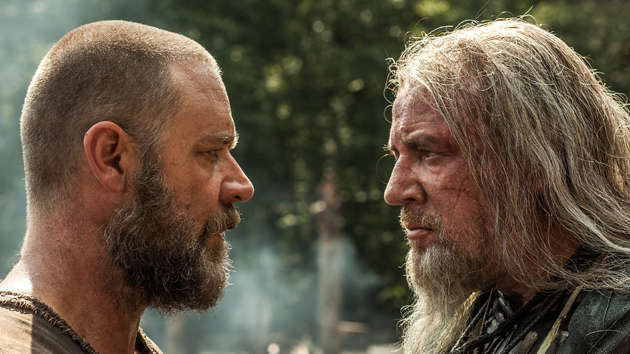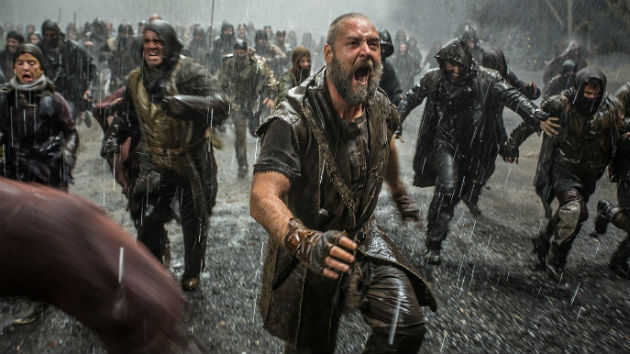The release of Darren Aronofsky’s film epic Noah last month left many pop-culture writers wondering: Why was the cast—the film’s representation of humanity before the great flood—so white? Ari Handel, who cowrote Noah with Aronofsky, drew critical responses a few weeks ago when he answered that very question, saying that “as a mythical story, the race of the individuals doesn’t matter” and that the film’s characters were “supposed to be stand-ins for all people.” PBS host Tavis Smiley called Handel’s comments “one of the most demeaning and dehumanizing portrayals of nonwhite humanity.”
Speaking Wednesday at an event sponsored by Climate Desk, the Center for American Progress, and the Sierra Club, Handel took a second crack at addressing the criticisms about the film’s lack of diversity, and he attempted to clarify his earlier comments.
Handel said that he and Aronofsky thought about the issue of diversity in the film before they even started writing it, and “there were times along the way when we almost abandoned the project because we weren’t sure how to solve the problem.”
“In this story, God, the highest moral authority of all, says very clearly that one family is good and deserves to be saved, and everybody else on the planet is wicked and deserves to die,” Handel said. “So those are really high moral stakes. And what was clear to us and essential was that we could not, no matter what, show racial differences between who lived and who died, or we’d be making a terrible, terrible statement.” Handel said that because of this, “we looked to make a cast, both on the boat and off the boat, who had as little difference as possible. And I want to be clear that there’s no reason that that cast had to be Caucasian. We could have cast any Noah and built the world around him.” After Russell Crowe was chosen for the role of Noah, he said, “the rest of the casting followed from there.”
“I think Ari said it perfectly,” added Aronofsky, who similarly said that “we nearly abandoned the project several times because we knew it would be an issue.”
You can watch Aronofsky’s and Handel’s comments above.
Here’s Handel’s full answer:
I’d actually like to respond to that because comments that I made, people took offense at, and I felt badly about that, because I felt things that I had said had been interpreted in ways that I didn’t intend.
The truth is we thought about the question of diversity, of humans, in the film from the very beginning, even from when we were starting to write it, even before we started writing it. And there were times along the way when we almost abandoned the project because we weren’t sure how to solve the problem.
And the problem really comes down to this for us: You know, this is the story, the story of Noah is, in this story, God, the highest moral authority of all, says very clearly that one family is good and deserves to be saved, and everybody else on the planet is wicked and deserves to die. So those are really high moral stakes. And what was clear to us and essential was that we could not, no matter what, show racial differences between who lived and who died, or we’d be making a terrible, terrible statement.
But the problem is there’s eight people on the boat, they’re in one family, they’re almost all from the same blood—you know, related by blood, so there’s no way to come even close to showing the full diversity of human beings on this planet amongst the survivors.
So actually what we did is, we went the other way. And we looked to make a cast, both on the boat and off the boat, who had as little difference as possible. And I want to be clear that there’s no reason that that cast had to be Caucasian. We could have cast any Noah and built the world around him.
In the end, as you know, we cast Russell Crowe, who is a tremendous actor and was a great fulfillment of Noah. And the rest of the casting followed from there.
And here’s what Aronofsky said after Handel spoke:
You get into—I think Ari said it perfectly. It becomes an issue because once again, it’s about you know, is it historical, or is it mythical? For us, I think the way we got out of it was saying, there was no solution to it, and as Ari said, we nearly abandoned the project several times because we knew it would be an issue. But it just came down to, we felt that it was just something I was very passionate about since I was a teenager, telling this story. And it was—something good would come out of it.
Image credit: Niko Tavernise/Paramount











